#hint hint it's not code for evil punching bag
Explore tagged Tumblr posts
Text
I'm sorry, maybe this is a bit petty to say, but like, the way some of these guys are like "I am being SILENCED!! Izzy fans are trying to prevent me from offering my brilliant critical analysis when they disagree with me!!"
And then their world shattering conclusion is basically, guuuuuuys you can't sympathize with Izzy or his trauma, he DESERVES losing his leg because he's the antagonist :((((
Because yk, antagonist and villain are totally the same thing, and as we all know there's never, in the history of ever, been a story with a sympathetic antagonist. I mean it's not like 'antagonist' literally just means the character/force that challenges or goes against the protagonist and it's entirely your own perception and experiences that shapes how you view the character. It's not like people can, le gasp, come to different conclusions on a character and that's like, extremely normal actually. It's not like it's you who's the weird one for prescribing a moral weight to the characters people sympathize with, considering yk, someone could easily do the same to you if they decided to do some reaching.
#and this is even agreeing that Izzy remains the antagonist in season 2#like they say this over and over again#you're only allowed to enjoy izzy as the meanie head antagonist that he is!#And then they showcase a child's understanding of what 'antagonist' even means#hint hint it's not code for evil punching bag#izzy hands#ofmd critical#fandom critical#izcourse#fandom discourse#ofmd
56 notes
·
View notes
Note
🦉Positivity owl reporting for duty! This was sent by a friend who wants you to smile as much as you make them smile. Please feel free to respond to this ask by listing some of your happiest memories, favorite qualities about yourself, or discussing something you are super passionate about. You may send the owl to those who you feel deserve to smile (but no pressure).🦉
Of course. Hyperfixation to go brrr.
So recently I finally decided to read Percy Jackson: The Lightning Thief as I've heard a lot of good things about it and recently read a different children's book in the escapist fantasy genre which I won't name because I was greatly disappointed in its mediocrity and nepotism.
I am so happy that Percy Jackson is an easy 9.5/10, its such an amazing book in so many ways.
It is written so well. The writing is very easy to handle and not straining. It was such a perfect change of pace compared to all the boring uni books I've been slogging through.
The references to Greek Mythology are abundant and fall perfectly into the range of accurate enough for the story Rick Riordan wants to tell; you can tell he loves the original myths. The idea that monsters cannot be perma-killed is also a neat way to allow famous Greek monsters to appear with minimal continuity issues. Didn't care for Poseidon's design but I love the modernised versions of all the other deities.
Page 113: "Number eight, the silver one, belongs to Artemis," he said. "She vowed to be a maiden forever. So of course, no kids. The cabin is, you know, honorary. If she didn't have one, she'd be mad."
My fave quote from the book, I love how it respects some of the gods abstinences and Artemis would 100% be a brat if she didn't get a cabin. Its just also sad that (since she's my fave), I cannot be a part of Artemis cabin without heavily HDing something.
The characters are all wonderful, I currently feel Sally Jackson is a bit shallow currently (which is a lot because of her lack of page time) but i do love the subtle hints and references towards the fact she is a much more complicated character than just a mary sue. I found Percy to be such a fun and relatable character (especially compared to Nepo-baby from Nepotism book) which might be because I also have ADHD with a troubled past.
Grover and Annabeth make such wonderful side characters, not a fan of how Annabeth being pretty is emphasised so much in their initial introduction but she's cool regardless.
Clarise makes such a cool bully but I wasn't keen on the 'evil=ugly' thing done with the Ares cabin and Gabe but that's only limited to those characters and not the other evil ones. I also wish Clarise wasn't such a punching bag to show off how cool Percy is.
I also love all the subtle nods that the Gods aren't good people, the system is inherently corrupt, and how being a half-blood isn't an amazing thing which'll solve all your problems. Every Half-blood in the story is either dead or visibly suffering from trauma. Its such a cool thing that Riordan was able to give such a nuanced narrative were both sides are arguably in the wrong in many aspects. One example being the cabins are grouped by godly parents and all unclaimed children go into the Hermes cabin leading to many cabins being empty while the Hermes cabin overflows.
Luke is such a well written character I love him so much, 100% my fave. You can feel his anger to the world and you can understand his pain. Often times when going through hardship, all we want to do is watch the world burn but that is wrong. Luke's suffering does not justify his immorality nor does it de-validate his core arguments of the gods being abusive of their power.
Also the disability representation is insane. So many characters are disabled in this book and its so cool. Even Grover is disability coded in the way his satyr legs are written about. Although this does lead to one of my biggest issues, the concept of all Half-bloods having ADHD/Dyslexia is bad, reminds me a lot of aspie supremacy and also the people who go 'its not a disability, its a different ability'.
All though it is a chosen one narrative, the book also does a good job showing Percy's weaknesses although I would wish the book did less of the naturally talented thing common in this genre but that is a part of the genre.
Another great aspect of the book is how it handles difficult topics which is done respectfully through conversation. It also does this in a more nuanced way by contrasting Percy and Annabeth; Annabeth decided to try and live with her parents once more (with the safety net of CHB) and Percy giving his mum the ability to kill her abusive husband. Was it moral to kill Gabe? I don't know but the contrast between the two does paint the picture that troubles like this are nuanced and should be dealt with on a case by case basis.
A small detail I liked is how they dealt with keeping the godly world hidden through the mist. The mist basically distorts any mortals vision (and implies it also alters ones mind but that's more questionable); this is a very all size fits all approach but much better than any alternative like, I don't know, wiping the memories of anyone who see's anything magical because that's just stupid and unfeasible.
A really cool thing about the author is he's openly pro-trans. I don't know why not being transphobic is important to note for a respected children's authors, should really be a expectation.
I could say more but I think I've said enough for now, go read Percy Jackson.
1 note
·
View note
Text
Cybertronix and accents
So, Cybertronix does have different dialects, most notably those of the colonies, the “founder’s tongue” of the old city-states where insular cultures have created their own version of the planet wide language, and the half code/half dialect junker talk, incredibly mutable and diverse, sometimes practically a foreign language to a junker from just the other side of the same city. Different dialects are still all Cybertronix, and mostly mutually intelligible, but they contribute a lot to perception and personality.
This means, of course, I’m gonna assign human accents to represent the vibes of a character’s speech.
(by the way, if you’re worried that I’m just taking a grab bag of random foreign accents and throwing them around, I’m not. Most of these accents I’ve heard from real people before, usually other uni students or roommates. I’m not just relying on stereotypical media portrayals and bad voice acting, I’m drawing on personal experience and associations with fond memories of my international friends.)
-40′s/50′s American Television Actors Accent: bog-standard “proper” Cybertronix, which of course is mostly just Iacon, Praxus, Polyhex, and Altihex. Upper class society in Rodion also sound like this.
people who sound like this: Orion Pax, Minimus Ambus, Arcee, Blackarachnia and Deadlock but very rough around the edges. Shockwave affects an accent like this to be more acceptable to his audience in the Senate. The Grand Architect technically has this accent, but the most striking thing about his voice is how impassive and intimidating he sounds, rather than his pronunciation.
-Posh Snobbish British Schoolboys Accent: much of Vos, where the higher you go, the more upper class you are, and thus the more posh and snobbish you are.
people who sound like this: Starscream, but he affects a heavier accent than he had as a middle class child. Skywarp and Thundercracker have mostly dropped theirs. Brainstorm, Perceptor. Slipstream has a very posh accent.
-German, But Like Specifically A Bavarian Accent: Tesarus, Helex, and parts of rural Tyrest. A strong, “noble” accent left over from a huge united empire prior to a united Cybertron, still considered a mark of a member of the backbone of society.
people who sound like this: Predaking, Tarantulas, Fort Max, Tailgate, Dion.
-German, But Like Specifically A Westphalian Accent: Tesarus mostly, with some communities in Stanix and groundside Vos. Considered rougher than the more “cultured” version above.
people who sound like this: Blitzwing, Makeshift, Jhiaxus, Shockwave when he gets too emotional or tired and forgets to stay upper class. Forestock also tries to drop this accent, but a lil less successfully.
(I’m also imagining some mix of Standard American German and Pennsylvania Dutch accents to be an in-between blend of standard Cybertronix and thicker Tesaran-style dialects.)
-Swiss French Because I’ll Be Damned Before I Willingly Give Anything Of France To Any Character Of Mine, Even An Accent: Tyrest and some of Praxus, also Crystal City. Lovely and charming, supposedly a mark of someone graceful and benign.
people who sound like this: Councilmember Tyrest, Skyfire, Terminus although he’s lost much of his accent. Prowl, Bluestreak, Smokescreen in his natural voice but he often obfuscates his accent.
-That Brooklyn Or Jersey Accent Where You Pronounce It Like Joizee: lower class Iacon, Polyhex, and most of Rodion. Sometimes called the junker’s accent (which is terribly inaccurate), folks with this accent aren’t going to be lauded by the upper class anytime soon. Full of slang and euphemisms.
people who sound like this: Rumble and Frenzy, Ravage, Powerglide, Swindle. Nightracer, Bludgeon, Wheelie, and Red Alert all have a specific version of this that marks them as junkers. Springer used to, but he’s started copying Prowl’s accent now. Hot Rod to a small degree.
-An Absolute Ace Aussie Accent: Carcer! Which, much like Australia, started as a penal colony that then turned into a regular colony and then a nation proper. It’s younger than the other colonies, and far from Cybertron, so they’re considered kind of backward and stupid, which means anyone with their accent is often automatically dismissed.
people who sound like this: listen I need you to imagine Ariel speaking like Steve Irwin but about to punch a croc instead of wrestle it. Also Obsidian.
-Brazilian, But Like Specifically Recife Accent: Tyger Pax, thickest in the city itself. Very animated and vibrant, super expressive, sometimes criticized for being loud, but it’s also very fun to listen to.
people who sound like this: Jazz, Alpha Trion but he sounds like he’s faking it, First Aid. Rosanna has been touring Cybertron as a pop star for long enough that she needs to deliberately practice her accent to keep it.
-Brazilian, But Like Specifically Southern Accent: Velocitron! Not only is the accent notable, but the speed at which they speak is very distinctive. They gotta say Everything Right Now Immediately.
people who sound like this: Moonracer, Swerve, Blurr (but he’s got a stutter too), Override, Knock Out.
-Portuguese, As In The Country, Which Is Different Than A Brazilian Accent: Eukaris! They speak very casually, unhurried, like a nice warm evening around the dinner table with family.
people who sound like this: Lickety-Split. I haven’t decided who else is from Eukaris yet.
-Sort Of Yiddish, Sort Of Polish, Sort Of Greek, I’m Thinking Specifically Of One Tricultural Friend’s Accent: Much of Tarn, a few parts of Kaon, and bits of Helex. Not wildly different from standard Cybertronix, but strong and heated and very opinionated, a good accent to be angry in.
people who sound like this: Cogman, Wheeljack, Lugnut, Megatron though he’s lost some of it.
-Russian, Not Evil Movie Villain Russian, Just A Real Russian Accent: Kaon and a good half of Tarn. They are very precise with what they mean, but not so much with the grammar and order of their words, which means their precision communication is often lost on outsiders.
people who sound like this: Strika, Damus, Wasp.
-Very Sweet, Folksy Ukrainian Accent: Devisiun! On a colony where everyone is born with siblings, most folks also adopt a pattern of speaking with or over people, especially with family and people they know best. A Cybertronian will consider a Devisian rude for talking in the middle of their sentence, but that’s a normal conversation for a Devisian! They’d consider it rude if the Cybertronian didn’t start responding to them in the middle of their sentence.
people who sound like this: Jetfire and Jetstorm, complete with finishing each other’s sentences.
-Korean Accent, Which Is Actually Closest To The Original Primal Vernacular: Caminus! They held on very tightly to their roots as a colony founded directly by one of the first Primes, so they’ve preserved a version of the first language that, while mutated by usage over the megavorns, is still closely connected to the tongue of the ancients.
people who sound like this: Windblade, Chromia, Firestar, Flareup, Nautica, some people swear Maccadam has a hint of this accent.
-Deep Southern Redneck Bumpkin Drawl From Down On The Range Accent: the moons! Luna 1 and 2 have very similar dialects, and very thick country drawls.
people who sound like this: Ironhide, Cosmos, Bulkhead, Kup uses this one because he picked it up on an early visit to Luna 1 and liked it so he keeps it.
#cybertron#caminus#velocitron#transformers#cybertronian culture#devisiun#eukaris#carcer#cybertronix#hehe languages#there is NO WAY i am tagging all these people
137 notes
·
View notes
Text
Rider of Clouds
A a loose adaptation of the Ugaritic Baal cycle of myths, with some changes and the holes patched up with other myths and historical trivia. It will probably go on and on as some sort of silly “myth crossover” thing. Mount Saphon, the spiritual center of a large but poorly defined area spanning from the Mediterranean Sea to the Euphrates and the residence of many gods, needs a new king. While the former king of the gods, El, favors his distant relative Yam, this decision is not popular with the other deities and would be a disaster for their human followers; however, few dare to question El decisions in public. The exception is Baal, the heir(ess) of El's popular but not very ambitious rival Dagan, determined to take Mount Saphon to the bright future of the late bronze age.
Protagonists
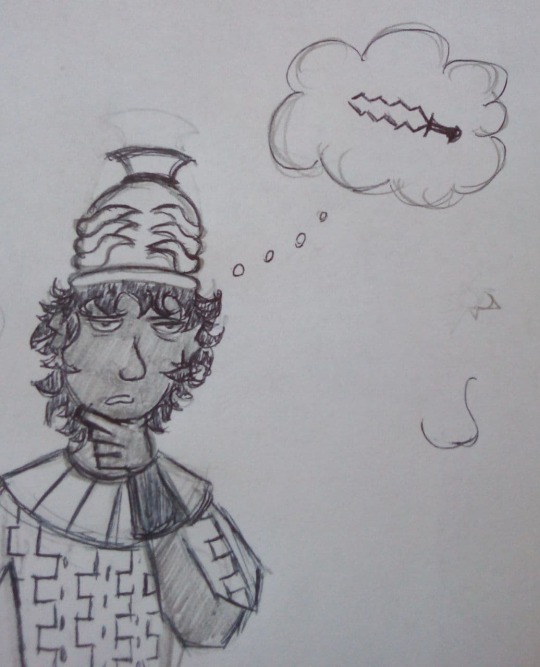
Baal (Hebat) – the eponymous Rider of Clouds (a real title used in myths and cult texts), a young weather deity born to Dagan and Shalash (not pictured), semi-retired agricultural gods who settled in Tuttul on the Euphrates shortly before Baal's birth. Dagan hails from Mesopotamia proper, while Shalash is Hurrian. While the mythical Baal Hadad is male, my version is a woman – the idea started as a joke about conflating Baal from the Baal cycle with Baalat Gebal, a female figure associated with another levantine bronze age city (BG's actual identity is an object of much scholarly debate) being more valid than conflating him with much later Baal Hammon from Carthage (or rather with Roman hot takes about this deity), which happens a lot online, but I got attached to it o now here we are. She nonetheless uses a male title inherited from her father, much like a few historical female rulers did. In my version “Hadad” is only a title (or rather a me, eg. divine attribute), and her real name is actually Hebat. Irl Hebat was, among other things, the name of a goddess mentioned in one inscription as Dagan's daughter, and thus a featureles sister of Baal. As the levantine/syrian Hebat lacks a defined character in real mythology (”another” Hebat was regarded as the Hurrian storm god's wife but was at times replaced in this role by the more interesting sun goddess of Arinna and that's about it; I'm not going to use that one in my story) it should be fine to conflate her with Dagan's best attested divine child, I think? Baal is impulsive and follows a moral code which, depending on the point of view, might be either naive or heroic, which means she's not exactly the optimal person to get involved in n-dimensional divine politics (the ideal person to be the protagonist of an Ugaritic epic poem, as evidenced by history), but that's not enough to stop her from trying; the popularity with humans helps, too. The story documents her rise to the position of the head god of the pantheon residing on Mount Saphon, ruling over Ugarit and other surrounding areas.
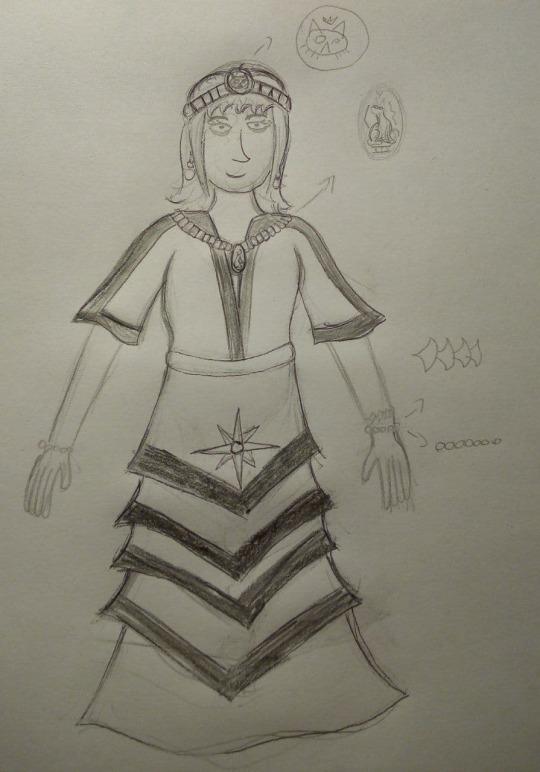
Astarte (it should be Ashtart for maximal accuracy but everyone knows the later form of the name better so...) – a goddess of humble origin and no particularly well defined attributes, who attaches herself to Baal initially in hopes of advancing own career, though the two eventually develop a more genuine relationship. She patterns herself after the much more famous Mesopotamian Inanna, seeing her as an ideal to strive for. While Baal has the name recognition and disposition fitting for a major deity, Astarte is the part of the duo actually capable of navigating politics, and takes the title of Face of Baal, negotiating support for Baal's bid with other gods. The image of Baal she projects differs slightly from reality, though not enough for most onlookers to notice. Astarte is also a connoisseur of foreign clothing (as pictured above) and art.
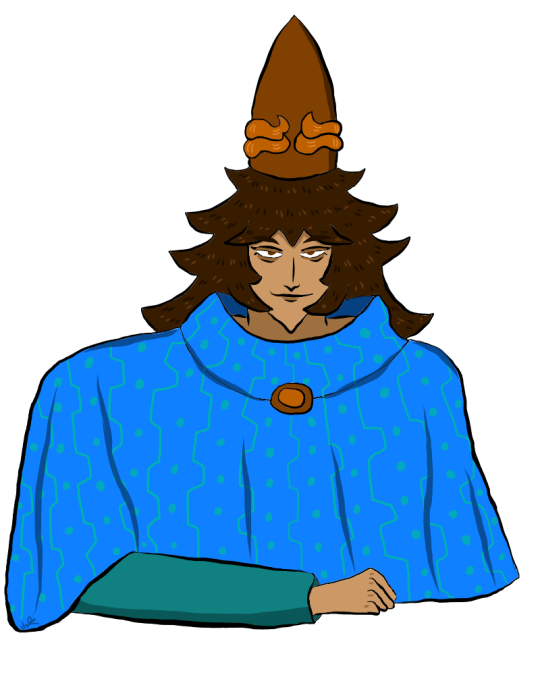
Anat (art courtesy of my girlfriend who sadly isn’t on tumblr but who helped a lot with figuring out a lot about this story) – the younger daughter of the ruling couple of Mount Saphon. Her philosophy differs greatly from her parents' and as a result she isn't really seriously considered for succession. Her hobbies include bladed weapons, gambling and heroic epics; in the past she attempted writing her own self insert one. Her temperament means she was never considered for succession, which she doesn't particularly mind. She's deeply invested in Baal's ascendance, and is probably the god Astarte wants to recruit for their cause the most.
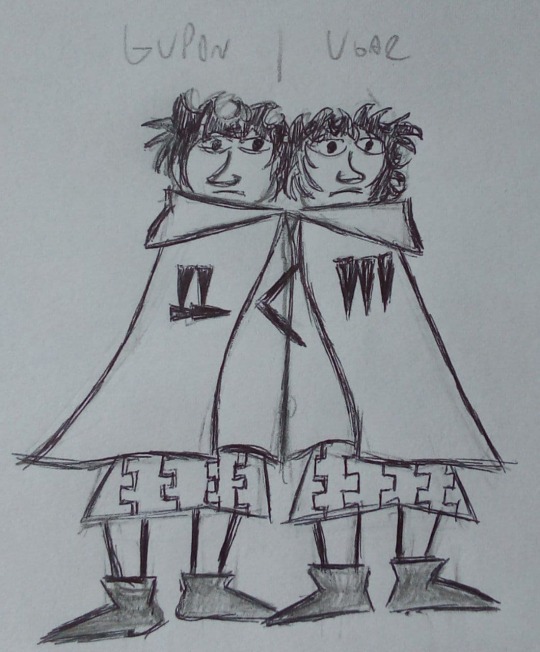
Gupan and Ugar – two minor gods who might be some of the only allies Baal recruited herself rather than with Astarte's help. They play a minor role in the story as her messengers and heralds (just like in the real myth!). They're also a couple. The cuneiform on their coats says “Baal.”
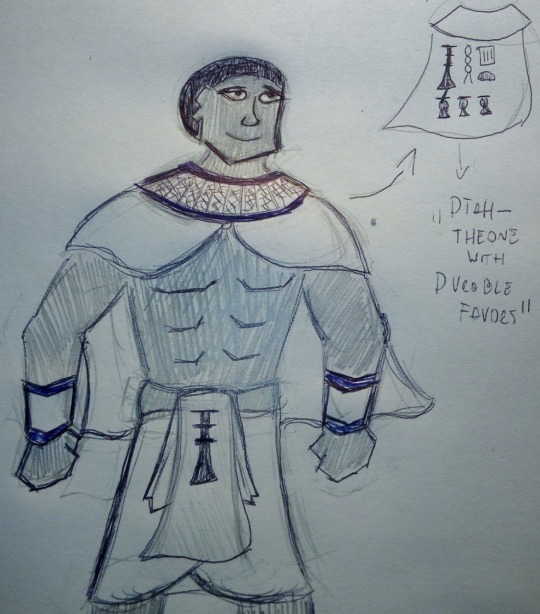
Kothar-wa-Khasis – a craftsman god who, by own admission, only works part time in Ugarit and travels the world for the rest of it. He's kind and dependable and his wares are both affordable and of great quality, but his real motives are hard to ascertain. His real identity is likewise a subject of much speculation among other gods – while his preferred manner of clothing hints at an egyptian origin, nothing is known for sure. His true name is that of the god Ptah of Memphis; he spends most time outside it and incognito because he thinks smaller pantheons on the periphery of Egypt's influence offer more artistic freedom. He speaks in a very poetic pointlessly complex way (basically... imitating the style of ancient poem translations). While an architect first and foremost he a reneissance man - architect, sculptor, engineer, armorer, musician. He isn't very fond of Yam due to the latter's lack of aptitude for art and cost cutting suggestions.

There are actually two gods hiding behind the title “Kothar-wa-Khasis,” with the second one hailing from Caphtor (Crete) from where Kothar arrives when commissioned to build Baal's palace in the real myth. She's shy and refuses to reveal her real name and hides behind the title “Mistress of the Labyrinth” and the labrys symbol. Her arrival is generally a sign of the duo taking a project particularly seriously.
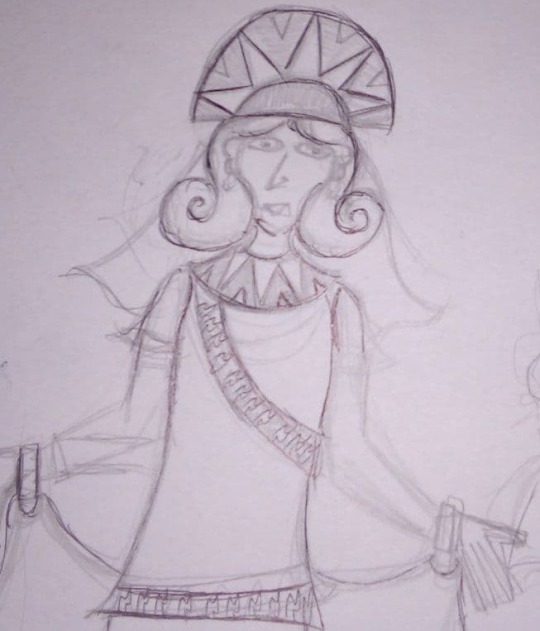
Shapash – El's firstborn daughter, serving as “the torch of the gods”, a royal herald and solar deity. She also handles her parents' “foreign policy” on their behalf, which in practice means figuring out how to placate neighbors whose decisions aren't guided by the need to avoid angering various reviled figures.
Antagonists
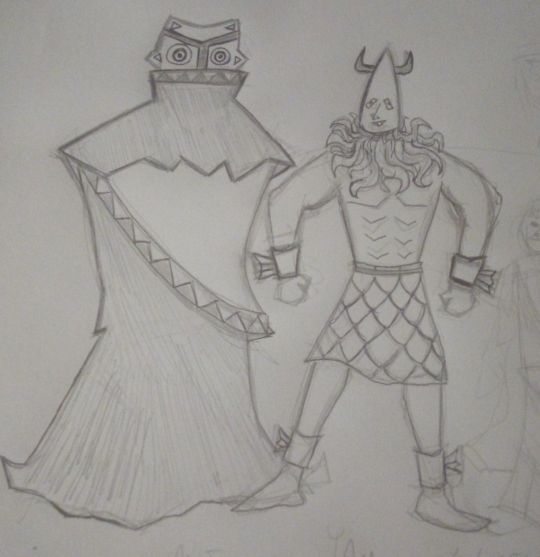
Yam (right) – a sea monster more than a god, presiding over the nearby section of the sea and all that dwells in it, including the commercially significant sea slugs. He's also the son of the formerly influential Anatolian god Kumarbi, banished to the underworld by the current head god Teshub due to his many past misdeeds. As a result of his father's past influence over the world (and current influence over the ruling couple), Yam gained El's support and received many titles, which de facto makes him the most likely to succeed El as the king of local pantheon. He's capricious and inconsiderate, but maintains a larger than life public image meant to make him palatable to potential backers. The exact circumstances of his arrival in Ugarit are shrouded in mystery, and may or may not be responsible for his unusually strong hatred of Baal. Mot (left) – profoundly unpleasant and unsociable being kept around by Anat's parents for unclear reasons. He resides in the great offering pit in the abandoned city of Urkesh, formerly the center of Kumarbi's sphere of influence, reduced to a ghost town. While his equivalents in neighboring areas generally view themselves as impartial or as a necessary evil, Mot gets his kicks from posing as a personification of death itself, and is notoriously corrupt. El and Athirat – the ruling couple of Mount Saphon and parents of Anat and Shapash, currently pondering retirement, which stirs many contenders to the throne into action. El is a lifelong opportunist changing views and allegiances as he sees fit, though he pretty consistently favors his distant relative Yam as his main underling ever since the latter arrived in the area.

El was originally Amurru, a courtier of the sky god Anu, overthrown by the nefarious Kumarbi. For unclear reasons Kumarbi made Amurru his vassal and bestowed the name Elkunirsa, or El for short, upon him.

Athirat is largely responsible for El maintaining his title for so long, and is a much craftier politician than he is. She comes from an influential dynasty of sea gods, but lacks dominion over the sea herself.

She and Yam are related, as seen here.
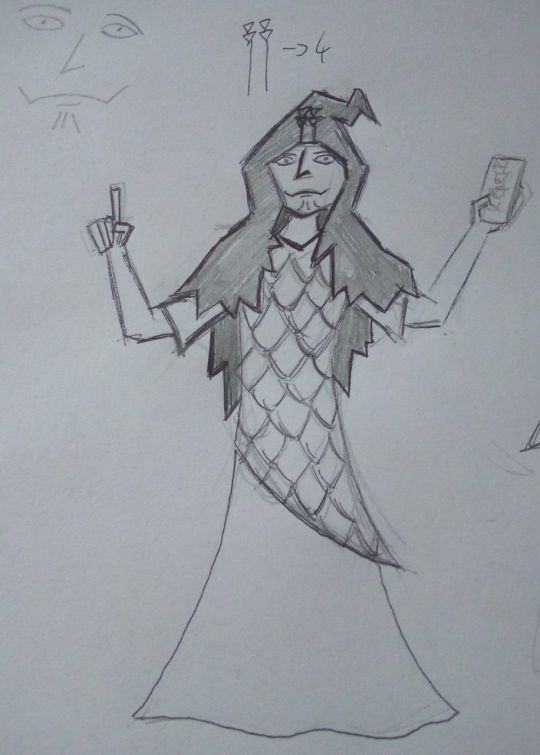
Abduyam – an attempt at developing an obscure figure from the original myth, Yam's nameless and seemingly rather rude and infuriating messenger, into a full blown character. The theophoric name he uses (there are real theophoric names invoking Yam, surprisingly) is just a pseudonym, and his real identity is a mystery. He interned under a variety of famous mythical villains in order to gain a greater understanding of their ways, and currently serves as Yam's messenger, adviser, doorkeeper and punching bag.

Ashtar – a feeble opportunist who sides with Yam, hoping to receive a share in the gains he's making thanks to El's blessings. He's pretty content with playing the role of a toady though his aspirations might be different, as Baal and Astarte suspect due to his love of gaudy imported textiles. Megalomania doesn't necessarily equal malevolence, though. He also loves sea slugs.
Foreign dignitaries

(ignore the ?, it’s just Baal) Marduk (right) – the tutelary deity of Babylon, a prominent and internationally renowned god. While technically the area encompassing Mount Saphon, where the events of the story take place, isn't directly under the control of the Babylonian pantheon, as one of the oldest in the world and the source of the writing it nonetheless has a tremendous impact on smaller neighbors. Formally Marduk is merely a representative of his father Enki and the assembly of the gods in Nippur, but as the old gods are not very mobile, he's the de facto acting head of the pantheon in foreign relations. He doesn't have a unified mythical narrative about himself yet at this point in time, despite his position, which is a source of insecurity for him. During travels, he's assisted by his personal aide and biographer, Nabu (not pictured), and his pet mushussu, Tishpak. Seth (left) – in real life, ancient Egyptians equated many gods of their neighbors with Seth; therefore in Rider of Clouds Seth serves as an ambassador of the Egyptian pantheon, usually residing in Gebal near Mount Saphon – a city whose gods (and human rulers) take pride in trying to be more Egyptian than the Egyptians themselves, and regard Seth as their spiritual liege (under the title “Lord of Lebanon”). While ultimately Marduk's judgment matters the most, Seth gets the right to veto his decisions when it comes to validating claims to local thrones. On good terms with Kothar-wa-Khasis, which is a subject of much gossip among other gods. Teshub (center) – the head of the Hurrian pantheon, technically capable of projecting the most power in Mount Saphon politics due to the Hurrian influence on huge number of other local pantheons, including that of the Hittites, thanks to his marriage to the Hittite sun goddess of Arinna; however, as the local gods for the most part share closer affinity with Mesopotamia than Hatti, he competes with Marduk for political influence. As he and Baal are a very similar type of god, he's the most outspoken supporter of Baal's ascension to the throne out of all 3 foreign dignitaries. El’s support for his nemesis is probably a factor, too.
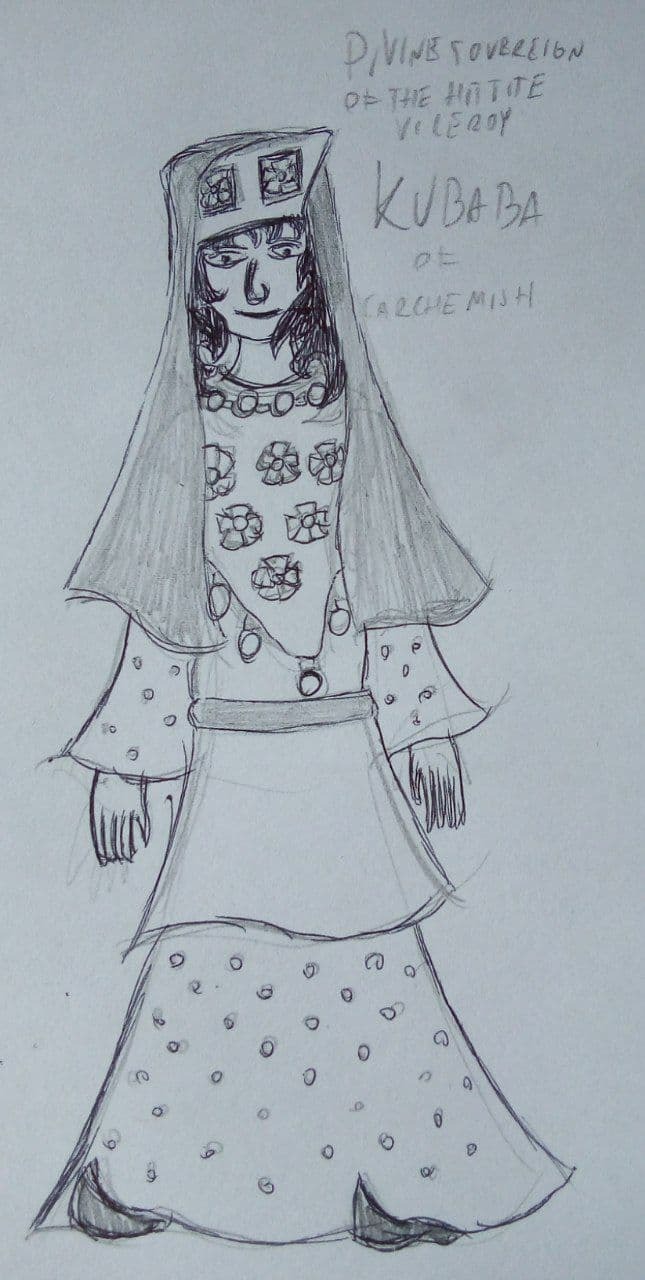
Kubaba – the head goddess of Carchemish; much like the king of Carchemish served as a Hittite viceroy taking care of affairs of the vassals irl, she acts as Teshub's ambassador in the southeast, mediating between the Anatolian and Syrian gods. She hopes that Baal's rise will normalize foreign relations to the benefit of her human followers – El's erratic behavior and sympathy for a number of widely detested figures made that rather difficult. While she's not much older than Baal, she poses as an ancient deity and dresses like someone twice her age. She also seeks opportunities to insert herself into suitably ancient narratives. In another time and place she'll be known as Cybele, and eventually as the Roman Magna Mater, but this is not the story about it.
Plot-relevant but not present in the story physically
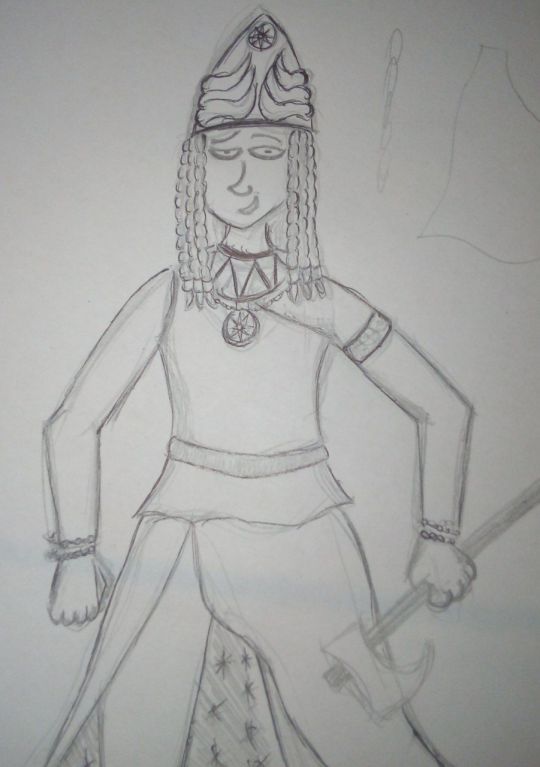
Inanna – the celebrity superstar of every pantheon from Hatti to Elam. After being elevated to one of the foremost positions among the gods she started a profitable franchising business, offering help with setting up own cult system and the right to use the title of “Ishtar” and the eight pointed star emblem in exchange for a share in potential profit and a spot in the franchisee' home pantheon. As her fame is unique even among the greatest of the gods, this isn't that bad of a deal. Other benefits of the franchising program include free tickets to the annual Ishtar meetup in Uruk and a 24/7 tech support line ran by her sukkal Ninshubur. Asides from Astarte, prominent members of the franchising program include the Hurrian Shaushka, the Elamite Pinikir, and the night goddess of Kizzuwatna.
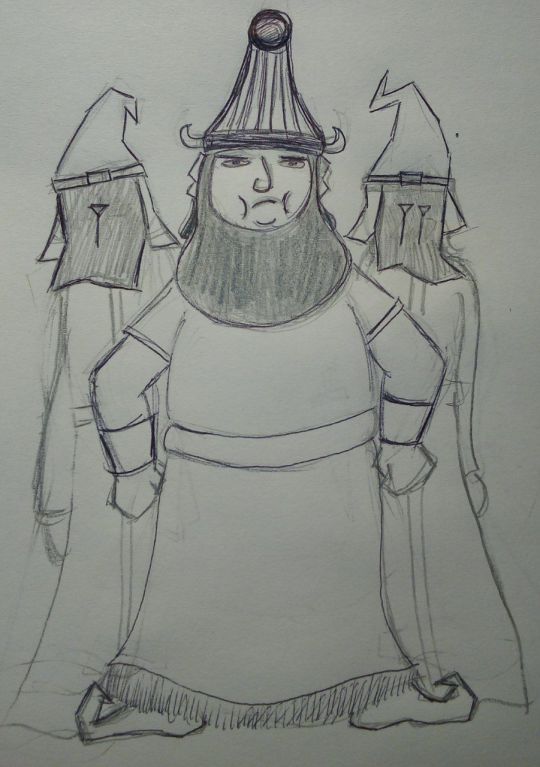
Kumarbi: an agricultural god of the Hurrians who seized the kingship of their pantheon violently before being overthrown himself by Teshub and his allies. Now he resides in the underworld and plots, aided by a network of allies – some opportunistic, some stupid, some simply malevolent. His will is usually carried out by an unspecified number of identical fate goddesses, possible to differentiate only by the numerals on their veils. At the core he and Baal's father Dagan are very similar gods in function, but not in temperament.
23 notes
·
View notes
Text
Melvin and the Silent Diagnosis for a Brilliantly Broken Psyche
Hypothetical Diagnosis Insecurity masked with narcissistic tendencies characterized with compulsive obsessions driven by blatant autism, and no that is not an immature insult I test extremely highly for Asperger's myself Here's the Evidence: (I will state before hand that Melvin-borg is a completely separate character in my mind, and thus will not be included in this particular theory. Melvin decided not to turn out like him, so they are canonically separate characters) He is obviously and frequently inspired by George and Harold, but his deeply embedded fear of rejection makes him dangerously bitter, and it doesn't help that everytime he breaks out of this protective shell, he is rejected or betrayed once again. It’s important to note that while he may be high-functioning (aka: Aspergers) he is still Autistic. That’s because Asperger’s is not a form of autism- it is autism. Period. And any kind of autism or mental attypicality left untreated can develop in to many, many other severe mental disorders, or, in general, make life a metric heck ton harder and complicated than it already is. I also need to confess that I test highly positively for autism myself as well as being an INTP female (Myers-Briggs Personality Test). Not to brag, but all that combined with my naturally creative nature makes me rare af, but it also means I can't communicate or handle stress #liketheothergirls, so that has lead me to being/feeling bullied and ostracized. I also have anxiety and depression issue which run in my family, and mild insomnia, and may or may not be relapsing into an eating disorder. Paired with psychical problems like acid reflux and severe neck tension, health, whether psychical or mental is of uttermost importance to me. It suffices to say, autism is not easy to deal with and if not taken care for properly a person, especially if not made at least aware of what autism truly is, it can truly ruin their life. Combined with the neglectful nature of his parents (at least in the books) I and many others in this fandom truly believe Melvin is at least autistically coded. Not only does this fit the archetype of his character but it also fits the theme of the books to a TEE. At its core, CU, of all things, is a children's book series, about living your best life despite not being “normal.” Even characters like the teachers or Mr Krupp who strive for “normality” are shown to actually have deeply repressed creativity, or, in some cases, deep trauma from their own childhoods. It suffices to say that I resonate deeply with Melvin. Say what you want about him or me, I was able to relate to him the second he spoke his first line in the second book. Sorry to turn this into a long vent, but I feel it is best to use myself to support this theory as well as harder evidence, even if it is mostly a means of self-therapy. To start, we both are obsessed with school even to a detrimental degree. Ever since head-start (Pre-K but a million times better), these "book-smarts" were the first thing I ever truly excelled at. When the other kids bullied (or as I now know as teasing) me, I would lose myself in a stack of homework or a book 2-3 grades past my grade level (this is before I drew or wrote as a main hobby). Similarly, Melvin is rarely seen without a book or gadget, just like me. We both over analyze things and hide our feelings. We both have intense crushes on others but are terrified to dare express them, or do but to nothing but awkwardness. We were both science kids, and fascinated by words and/or numbers alone (I still am just in a more artistic way). We both struggle to communicate and relate to others. We both have a unusual sense of humor and are highly observant of surroundings all the while missing what’s in front of our noses. We both have interests that quickly spiral into obsessions and dropping the obsession only when sick of it. We both practice similar forms of stimming. We both not only thrive but crave control and structure with the world around us, even to the point of being "control freaks" and creating odd habits, routines, and rituals regardless of whether they are necessary or make sense. We both have an intense fear of intimacy and rejection to the point of practicing self-isolation and in some cases self harm or other unhealthy coping methods (seen with Melvin over eating sweets or over working himself. For me it’s disordered eating or self flagellation, something I have all but completely dropped but still) We also both tend to see ourselves as inferior to others and attempt to mask those feelings with a superiority complex (I feel bad for my siblings but I didn’t know what I was doing, and no it was not abusive just sibling rivalry and I’m the oldest anyway, and we are country kids and understand “rough-housing” =/= using each other as a punching bag, but accidents happen I'm sorry) We both seem to become easily overstimulated and have explosive mental and emotional breakdowns when things just . . . become too much However the harsh divide between male and female and fictional and nonfictional means we both present certain traits differently. Whereas he presents a more linear line of thinking my mind is overwhelmingly sporadic. Also, I have over sensitivities to touch and light (and sometimes certain noises, but not anything not normal? Wfk.) But maybe he does have oversensitivity but I can't think of an example off the top of my head. Enough about me however. I know Melvin and autism has been done to death. Hell, I just did it to death. My actual theory is more on the inner mechanisms of his mind and predicting how he will develop should the series allow for full character development. Also, similar to my Krupp theory, I will be listing his crimes out and give him a proper sentence for his age and maturity level (which will be light as I am sympathetic to his plight). This is already getting too long, so Imma try to finally get to the point. Characters with autism are honestly a mixed bag, sometimes there as standardized as my mystery Daddy Sherlock Holmes and other times they are as subtle as Pearl or Peridot from Steven Universe (has Rebbaca Sugar confirmed this? sorry). Honestly, it does distress me that autism is almost always used to have an evil genius character or some weird side character for brownie/ diversity points. (this makes me a bit hypocritical I guess, considering my own stories. I guess tropes are tropes for a reason) And while Dav Pilky May not be subtle with his scholastic politics or humor his one spectacular tool in his writing books has always been, when it comes to his characters, showing instead of telling. This is something I latched on to even as a kid, and I was already thinking up theories on the characters before I even knew character theories were a thing. Like what happened to Harold's Dad (hint, hint). Why was Harold's sister rarely used? Does Mr Krupp actually like their comics (a now accepted theory, but not just min? And many many others I'm probably never gonna write. It took until how long in the books to reveal George and Harold have ADHD? Before that they were simply described as being as smart as Melvin but just in different ways. Personally I feel that autism is inverted ADHD. This is an opinion I’ve recently formed so if I’m wrong bloody attack me in the comments. Anyway, Melvin presenting autism makes him the perfect foil to George and Harolds’ more sporadic antics. The only true difference between autistic folks and ADHD folks is that those with autism tend to crave a structured environment full of rules, and set goals to achieve, while such an environment is HELL to children with ADHD (aka:George and Harold). (Even though if with adults they can trust, children with ADHD thrive in structured environments if they are surrounded by adults or authority figures they can trust.) I know some will tell me ADHD is on the spectrum, but I just learned this like actually the other day and don’t fully understand it. My prediction is that Melvin will eventually and naturally mellow out if just because staying so high strung all the time is a huge waste of mental energy. I know good as hell I had to. Also, he mellowed our in the books and went from a screeching revenge exacting lil narcissistic white boi prick to a person who simply wants to pursue his interests and even helping George and Harold (selfishly, but help nonetheless). He even went from enjoying the fame and attention of hero-ing to realizing it did not fufill him. Indeed quite the opposite. His true passion lay in solving world problems through science, and I don't think the ending for him in the books could have been any more perfect considering his character. In the Netflix show, similar to how I think Krupp's personalities are merging, I believe that Melvin will eventually become more like his Broski alter ego (which I calmly demand more of). Overall, given that this show needs to go back to the status quo more often than not, I don't think his core character will ever change, and it doesn't need to. Multiple times throughout the series he's been shown to crave friendship from George and Harold, despite audibly hating him . Textbook Tsundere, I know. He will form a friendly rivalry with George and Harold, I have almost no doubt about that, taking the season 1 finale, season 2 finale, season 3 first episode, and halloween special into consideration. (Yeah, if someone will send me clips I will give them my eternal gratefulness) To conclude, because by god this is long, Melvin is, SHOCKER, just a little kid. A little kid who likes muffins and dolls and has big hopes and dreams. A little kid whose love for science and unrecognized creativity is channeled into making inventions that are even more impressive than those of Professor P (sorry P). But he is a little kid with his own needs and stuggles which at this point remain unmet. His parents are canonically neglectful, I cannot repeat that enough times. The effects of neglect are a hell-hole of its own regardless of growing up with undiagnosed autism. But that's just a theory- Alright, that was a banger, I guess next up is Melvin-borg since writing this has given me some interesting ideas for him. Let’s see how long this hyperfocus train will go!
#captain underpants#melvinsneedly#melvin#georgeandharold#george#harold#mrkrupp#davpilky#theory#cutheory#thetheorizer#thetheory#filmtheory#booktheory#tvtheory
26 notes
·
View notes
Text
Rider of Clouds (again)
After going through more sources on Ugaritic mythology and the “storm god versus the sea” motif as a whole in Anatolia, Levant, Egypt and Mesopotamia, I decided to post about the characters meant for my loose Baal Cycle retelling again.
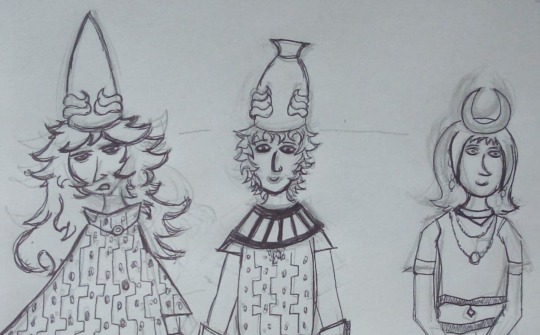
Baal (middle) – the eponymous Rider of Clouds, a young weather deity born to Dagon and Shalash, largely retired agricultural gods who settled in Ugarit shortly before Baal's birth. While the mythical Baal Hadad is male, my version is a woman – the idea started as a joke about conflating Baal from the Baal cycle with Baalat Gebal, a female figure associated with another levantine bronze age city (BG's actual identity is an object of much scholarly debate) being more valid than conflating him with much later Baal Hammon from Carthage, which happens a lot online, but I got attached to it (a certain artifact which is variously interpreted as representing either a short-haired noblewoman or a prince was a factor too) so now here we are. She nonetheless uses a male title inherited from her father, much like a few historical female rulers did. In my version “Hadad” is only a nickname, and her real name is actually Hebat, who is a goddess mentioned in one inscription as Dagan's daughter. As the levantine/syrian Hebat lacks a defined character in real mythology (another Hebat was regarded as the Hittite storm god's wife but was replaced in this role by the sun goddess of Arinna and that's about it) it should be fine to conflate her with Dagan's best attested divine child, I think. Baal is impulsive and follows a moral code which, depending on the point of view, might be either naive or heroic, which means she's not exactly the optimal person to get involved in n-dimensional divine politics, but that's not enough to stop her from trying. The story documents her rise to the position of the head god of Ugarit's pantheon. Astarte (right) – a goddess of uncertain origin and no particularly well defined attributes, who attaches herself to Baal initially in hopes of advancing own career, though the two eventually develop a more genuine relationship. She patterns herself after the much more famous Mesopotamian Inanna, seeing her as an ideal to strive for – especially when it comes to trickery. While Baal has the name recognition and disposition fitting for a major deity, Astarte is the part of the duo actually capable of navigating politics, and takes the title of Face of Baal, negotiating support for Baal's bid with other gods. The image of Baal she projects differs slightly from reality, though not enough for most onlookers to notice. Ignore the crescent moon diadem, it'll be replaced as soon as I'll draw her again. Anat (left) – the younger daughter of Ugarit's head god, El. Her philosophy differs greatly from her parents' and as a result she isn't really seriously considered for succession. Her hobbies include bladed weapons, gambling and heroic epics; in the past she attempted writing her own self insert one. She's deeply invested in Baal's ascendance, and is probably the god Astarte wants to recruit for their cause the most.
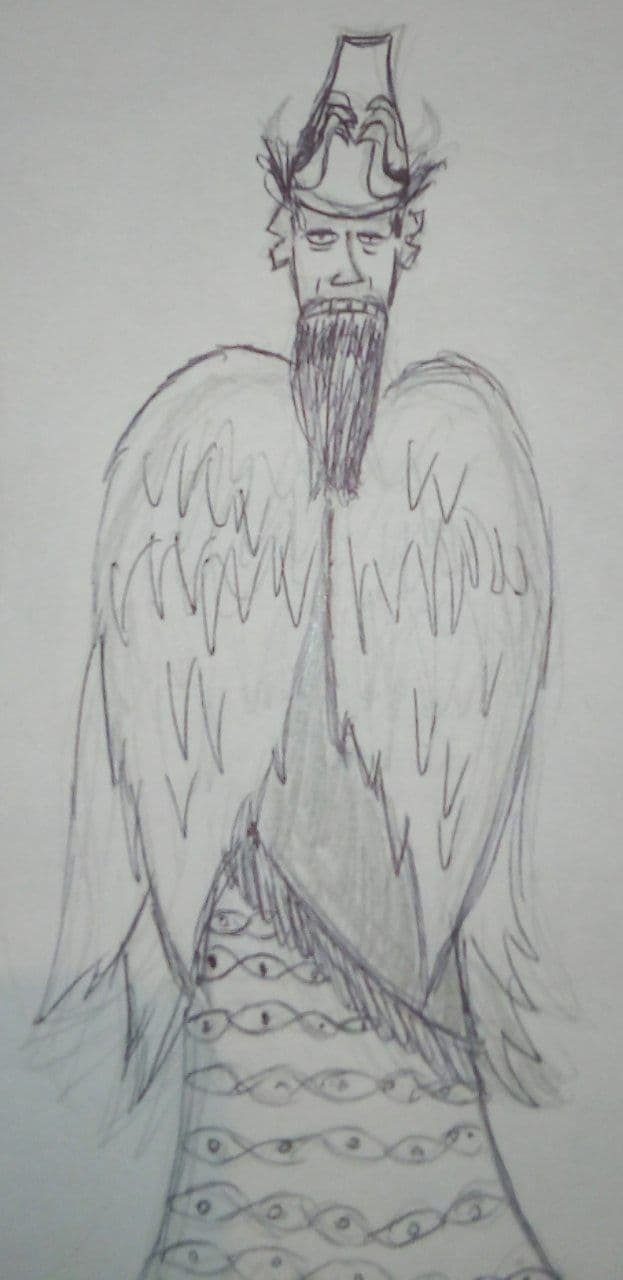
El and Asherah – the ruling couple of Ugarit, currently pondering retirement, which stirs many contenders to the throne into action. El is a lifelong opportunist changing views and allegiances as he sees fit, though he pretty consistently favors Yam as his main underling. His wife (image tbd) generally holds similar views, though has some qualms about Yam's rise to power.
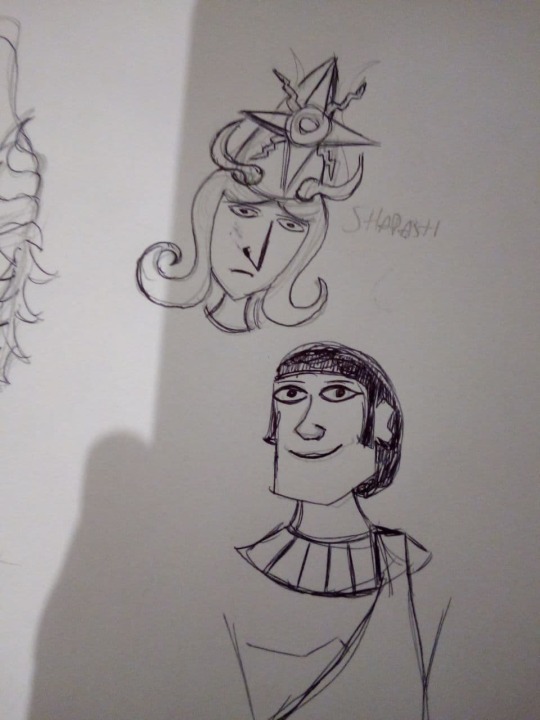
Kothar-wa-Khasis – a craftsman god who, by own admission, only works part time in Ugarit and travels the world for the rest of it. He's kind and dependable and his wares are both affordable and of great quality, but his real motives are hard to ascertain. His real identity is likewise a subject of much speculation among other gods – while his preferred manner of clothing hints at an egyptian origin, nothing is known for sure. He's also a talented musician. Shapash – El's firstborn daughter, serving as “the torch of the gods”, guaranteeing Ugarit gets its fair share of sunlight. Her political allegiance is unknown.
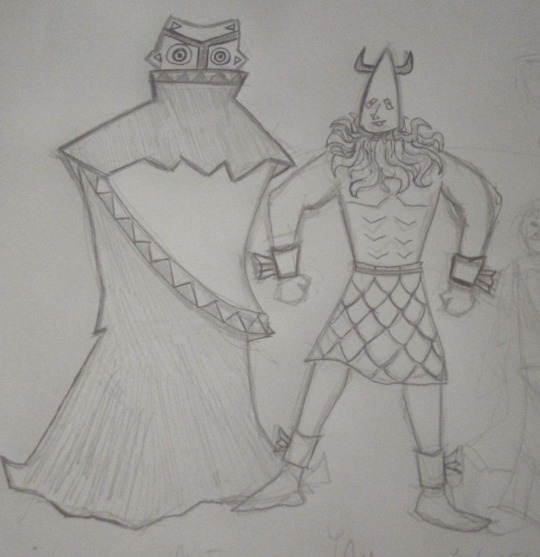
Yam – a sea monster more than a god, presiding over the nearby section of the sea and all that dwells in it, including the sea slugs important for the human inhabitants of the area. He's also the son of the influential Anatolian god Kumarbi, banished to the underworld by the current head god Teshub. As a result of his influence, he gained El's support and received many titles, which de facto makes him the most likely to succeed El as the king of local pantheon. He's capricious and inconsiderate, but maintains a larger than life public image meant to make him palatable to potential backers. The circumstances of his arrival in Ugarit are shrouded in mystery, and may or may not be relate for his unusually strong hatred of Baal. Ashtar (image tbd) – an opportunist who sides with Yam, hoping to receive a share in the gains he's making thanks to El's blessings. He's pretty content with playing the role of a toady though his aspirations might be different, as evidenced by his gaudy fashion preferences. Yam’s messenger (image tbd) – an attempt at developing an obscure figure from the original myth, Yam's nameless and seemingly rather rude and infuriating messenger, into a full blown character. His real identity is a mystery. He interned under a variety of famous mythical villains in order to gain a greater understanding of their ways, and currently serves as Yam's messenger, adviser, doorkeeper and punching bag. Mot – profoundly unpleasant and unsociable being tasked with maintaining Ugarit's very own underworld. While his equivalents in neighboring cultures generally view themselves as impartial judges or a necessary evil, Mot gets his kicks from posing as a personification of death itself, and is notoriously corrupt.
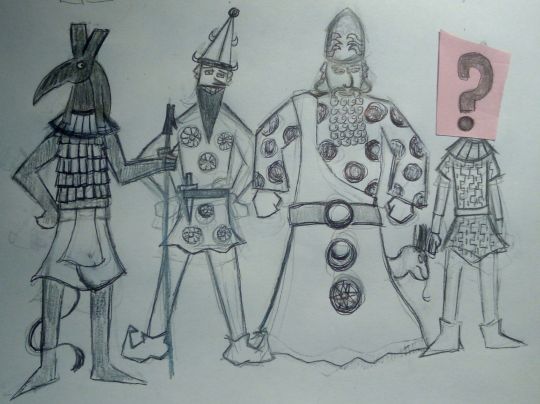
Marduk – the tutelary deity of Babylon, reigning as the king of gods of most of Mesopotamia and its neighbors. While technically Ugarit isn't directly under his control, he still is the god whose confirmation is necessary to rise to the position of the head of a local pantheon. He doesn't have a unified mythical narrative about himself yet at this point in time, despite his position, which is a source of insecurity for him. During travels, he's assisted by his personal aide and biographer, Nabu, and his pet. Seth – in real life, ancient Egyptians equated many gods of their neighbors with Seth; therefore in Rider of Clouds Seth serves as an ambassador of the Egyptian pantheon. While ultimately Marduk's judgment matters the most, Seth gets the right to veto his decisions when it comes to validating claims to local thrones. On good terms with Kothar-wa-Khasis, which is a subject of much gossip among other gods. Teshub – the head of the Hittite and Hurrian pantheon, technically capable of projecting the most power in Ugarit's politics; however, as the gods of Ugarit share closer affinity with Mesopotamia than Hatti, he competes with Marduk for political influence. As he and Baal are a very similar type of god, he's the most outspoken supporter of Baal's ascension to the throne out of all 3 foreign dignitaries. Ignore the ?, it’s just Baal. Gupan and Ugar – two minor gods who might be some of the only allies Baal recruited herself rather than with Astarte's help. They play a minor role in the story as her messengers and heralds. They're also a couple. Kubaba – a pretender to the throne of the head deity of the pantheon of Carchemish, a city-state close to Ugarit. Involved with the Hittite Sun Goddess of the Underworld in some capacity. This is, however, not their story. If you follow my oc posts you can probably guess which one is about them.
11 notes
·
View notes